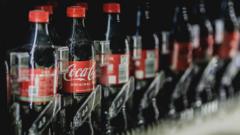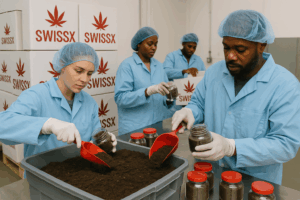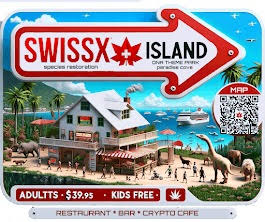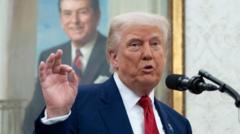Coca-Cola is considering increasing its reliance on plastic bottles in response to the financial impact of President Trump's recently imposed tariffs on aluminum and steel, which could push up the price of aluminum cans substantially.
Coca-Cola Eyes Increased Plastic Use Amidst Trump Tariffs

Coca-Cola Eyes Increased Plastic Use Amidst Trump Tariffs
Beverage giant warns of potential shift to plastic bottles due to rising aluminum costs from tariffs.
In a call with investors, CEO James Quincey indicated that if the costs of aluminum cans rise due to Trump's 25% import tax on aluminum and steel, the company may have to adjust its strategy by selling more beverages in plastic packaging instead. Coca-Cola had aimed to promote sustainability by using more aluminum, as it is seen as more recyclable than plastic. However, the recent tariff changes have prompted the company to rethink this approach.
Quincey's comments come amid concerns regarding Coca-Cola’s environmental impact, as the company has faced criticism from environmental groups for being the "top global plastic polluter" for six consecutive years. After acknowledging potential increases in packaging costs, Quincey stated that Coca-Cola offers multiple packaging options to maintain affordability, suggesting that PET plastic bottles may become more prominent if aluminum costs escalate.
The economic consequences of these tariffs could make drinks in aluminum cans less viable, forcing Coca-Cola to pivot back to plastic bottles. Notably, the U.S. imports nearly half of its aluminum, and the expanded tariffs are expected to increase costs significantly. Previously, some can manufacturers received exemptions from similar tariffs imposed in 2018, but President Trump has indicated that this time there will be no exceptions made.
Compounding these developments, Trump’s recent executive order that halts the government’s initiative to phase out plastic straws in favor of paper ones has further raised concerns about increasing levels of plastic pollution in the U.S. This move goes against the measures introduced by former President Joe Biden, who emphasized the urgency of addressing plastic pollution.
As Coca-Cola navigates these economic challenges, the beverage industry will be watching closely to see how these tariffs influence packaging decisions and sustainability efforts moving forward.
Quincey's comments come amid concerns regarding Coca-Cola’s environmental impact, as the company has faced criticism from environmental groups for being the "top global plastic polluter" for six consecutive years. After acknowledging potential increases in packaging costs, Quincey stated that Coca-Cola offers multiple packaging options to maintain affordability, suggesting that PET plastic bottles may become more prominent if aluminum costs escalate.
The economic consequences of these tariffs could make drinks in aluminum cans less viable, forcing Coca-Cola to pivot back to plastic bottles. Notably, the U.S. imports nearly half of its aluminum, and the expanded tariffs are expected to increase costs significantly. Previously, some can manufacturers received exemptions from similar tariffs imposed in 2018, but President Trump has indicated that this time there will be no exceptions made.
Compounding these developments, Trump’s recent executive order that halts the government’s initiative to phase out plastic straws in favor of paper ones has further raised concerns about increasing levels of plastic pollution in the U.S. This move goes against the measures introduced by former President Joe Biden, who emphasized the urgency of addressing plastic pollution.
As Coca-Cola navigates these economic challenges, the beverage industry will be watching closely to see how these tariffs influence packaging decisions and sustainability efforts moving forward.






















